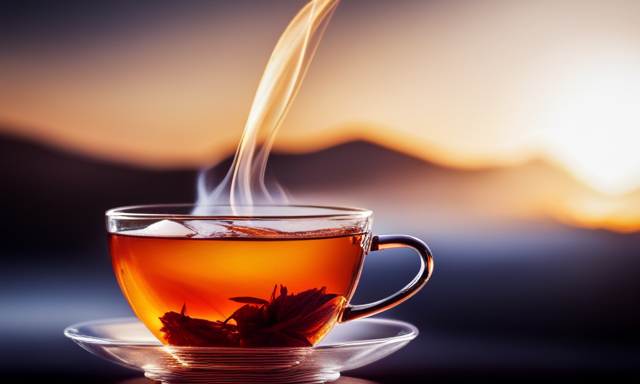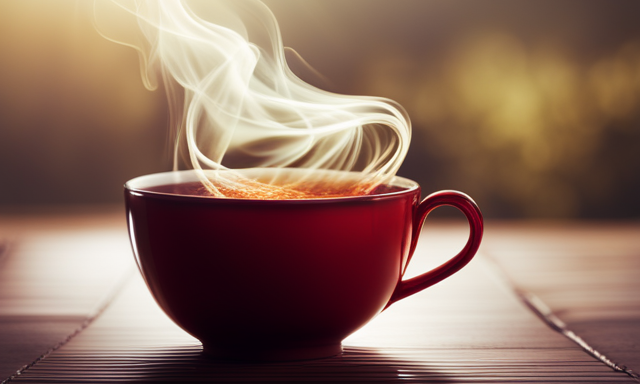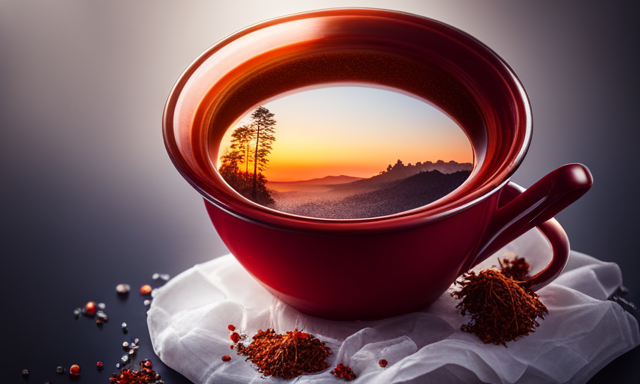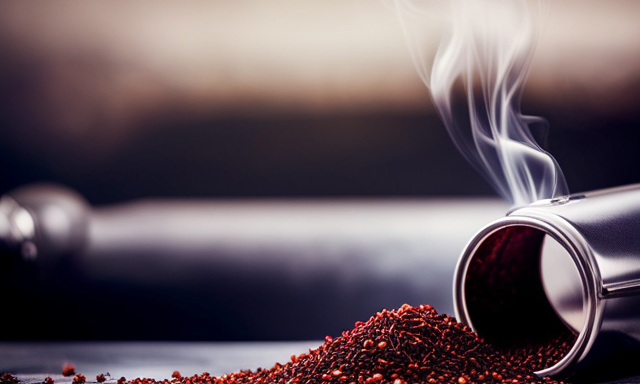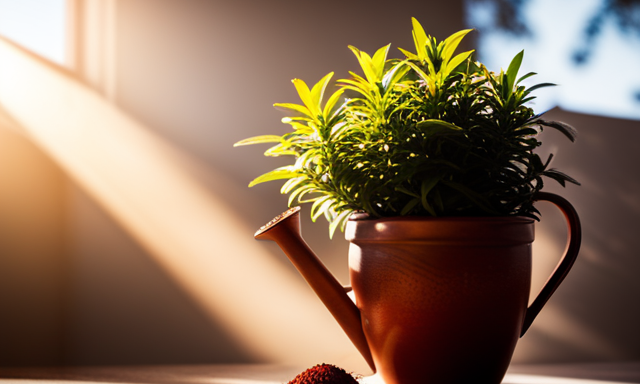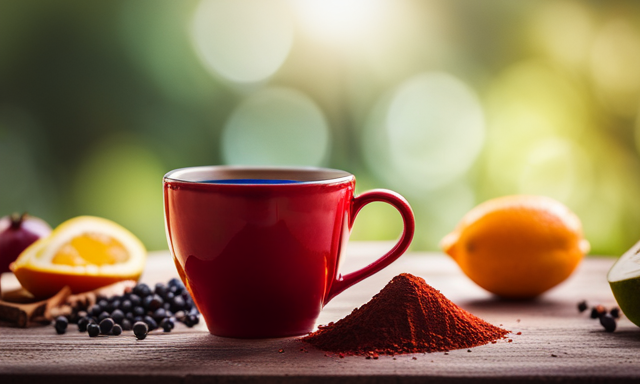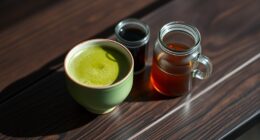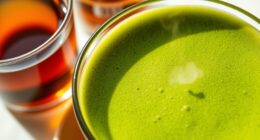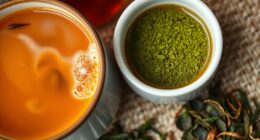As I sit here, sipping my steaming cup of rooibos tea, I can’t help but wonder about its caffeine content. Rooibos tea has become my go-to beverage when I want to relax and unwind, but I’ve always been curious about how much caffeine it actually contains.
So, I decided to dive into the world of caffeine and explore the levels found in different types of tea. Join me on this journey as we uncover the unique qualities of rooibos tea and discover how it compares to other caffeine-free beverages.
Along the way, we’ll discuss the benefits of choosing rooibos tea as a caffeine-free option and share some tips for managing caffeine intake. By the end of this article, you’ll be armed with the knowledge to make informed choices about your tea consumption.
So, grab a cup of your favorite brew, and let’s delve into the caffeine mysteries of rooibos tea.
Key Takeaways
- Rooibos tea is naturally caffeine-free.
- Rooibos tea is made from the Aspalathus linearis plant and is also known as red tea.
- Rooibos tea has been consumed for centuries and originates from South Africa.
- Rooibos tea is a popular choice among tea enthusiasts seeking caffeine-free options.
Understanding Caffeine and its Effects on the Body
You’ll be surprised by how caffeine affects your body and the ways it can impact your overall well-being. Understanding caffeine metabolism is essential to comprehend its effects on the body.
When you consume caffeine, it is quickly absorbed into the bloodstream and travels to the brain, where it blocks adenosine receptors. This action promotes wakefulness and alertness. However, caffeine also has a half-life of about 5-6 hours, meaning it can stay in your system for a significant amount of time. This can interfere with sleep, making it harder to fall asleep and stay asleep.
It’s important to be aware of your caffeine intake and its potential impact on your sleep quality.
Now, let’s explore the caffeine content in different types of tea.
Exploring the Caffeine Content in Different Types of Tea
When exploring different types of tea, it’s fascinating to see how the caffeine content varies significantly between varieties.
Here are some examples:
-
Black tea: It’s known for its robust flavor and rich caffeine content. On average, an 8-ounce cup of black tea contains about 40-70 milligrams of caffeine.
-
Green tea: This tea is renowned for its health benefits and lower caffeine content. A typical 8-ounce cup of green tea contains around 20-45 milligrams of caffeine.
-
Herbal tea: Unlike black and green tea, herbal teas aren’t made from the Camellia sinensis plant, so they naturally contain no caffeine.
-
Rooibos tea: Similar to herbal tea, rooibos tea is naturally caffeine-free, making it a popular choice for those looking for a caffeine-free alternative.
Now, let’s delve into what makes rooibos tea unique and why it has gained popularity among tea enthusiasts.
What Makes Rooibos Tea Unique?
Rooibos tea stands out from other varieties with its distinct flavor and health benefits, making it a favorite among tea enthusiasts. This South African herbal tea is known for its smooth, slightly sweet taste and unique red color. What sets rooibos tea apart is its numerous health benefits, including its rich antioxidant content, which can help boost the immune system and promote overall well-being. Additionally, rooibos tea is caffeine-free, making it a great alternative for those looking to reduce their caffeine intake.
To give you a better idea of the different flavor profiles of rooibos tea, take a look at the table below:
| Flavor Profile | Description |
|---|---|
| Earthy | Woody and natural |
| Floral | Fragrant and flowery |
| Fruity | Sweet and fruity |
Rooibos tea offers a range of flavors to suit different preferences. Now let’s delve into the caffeine levels in rooibos tea.
The Caffeine Levels in Rooibos Tea
Contrary to popular belief, rooibos tea is a soothing elixir that won’t leave you tossing and turning at night, providing a gentle hug to your senses instead. One of the reasons for this is its low caffeine content.
Rooibos tea is naturally caffeine-free, making it a great choice for those with caffeine sensitivity or those who simply want to avoid the stimulating effects of caffeine. This makes it an excellent alternative to traditional teas and coffee, which can often leave you feeling jittery or restless.
Instead, rooibos tea offers a calming and relaxing experience, perfect for winding down after a long day. So, if you’re looking for a warm and comforting drink without the caffeine, rooibos tea is the way to go.
Now, let’s explore how rooibos tea compares to other caffeine-free beverages.
How Does Rooibos Tea Compare to Other Caffeine-Free Beverages?
If you’re looking for a caffeine-free beverage that offers a variety of flavors and options, you’ll love exploring the world of herbal teas, fruit infusions, and decaffeinated coffees. These beverages not only provide a soothing and refreshing experience but also come with their own unique health benefits.
When it comes to the caffeine content in herbal teas, they generally have zero to minimal caffeine, making them a perfect choice for those who are sensitive to caffeine or want to limit their intake. Some popular caffeine-free options include chamomile tea, peppermint tea, and ginger tea. These herbal teas are known for their calming properties, aiding digestion, and soothing an upset stomach.
When compared to other caffeine-free beverages, herbal teas offer a wide range of flavors and therapeutic benefits. Moving forward, let’s explore the benefits of choosing rooibos tea for a caffeine-free option.
Benefits of Choosing Rooibos Tea for a Caffeine-Free Option
You’ll be delighted to discover the numerous benefits of choosing rooibos tea as your go-to caffeine-free option. From its rich flavor to its array of therapeutic advantages, rooibos tea offers a unique combination of health benefits. It’s rich in antioxidants, which help protect the body against free radicals and reduce the risk of chronic diseases.
Rooibos tea is also known for its anti-inflammatory properties, which can alleviate symptoms of allergies and promote overall well-being. Additionally, this tea is caffeine-free, making it a perfect choice for individuals who are sensitive to or trying to avoid caffeine.
So, not only can you enjoy the delicious taste of rooibos tea, but you can also reap the benefits of its high antioxidant content and caffeine-free nature.
Transitioning into the next section, let’s explore some tips for enjoying rooibos tea and managing caffeine intake.
Tips for Enjoying Rooibos Tea and Managing Caffeine Intake
Indulge in the delightful experience of savoring the flavors of rooibos tea while effectively managing your caffeine intake.
Rooibos tea is a great option for those looking for a caffeine-free alternative. It not only offers a rich and earthy taste but also provides several health benefits. Rooibos tea is packed with antioxidants, which can help boost the immune system and reduce inflammation. Additionally, it is known to promote digestion and improve heart health.
When it comes to managing caffeine intake, rooibos tea is a perfect choice. It’s naturally caffeine-free, making it suitable for individuals who are sensitive to caffeine or want to limit their intake.
By incorporating rooibos tea into your daily routine, you can enjoy the numerous health benefits it has to offer while staying mindful of your caffeine consumption.
In conclusion, making informed choices about your tea consumption is essential for maintaining a healthy lifestyle.
Conclusion: Making Informed Choices About Your Tea Consumption
In the end, it’s all about being tea-savvy and making informed choices to maintain a healthy and enjoyable tea-drinking experience. When it comes to managing caffeine intake, there are a few key factors to consider:
-
Understand your personal caffeine sensitivity: Everyone’s body reacts differently to caffeine, so it’s important to know your own limits and how caffeine affects you personally.
-
Read the labels and do your research: Take the time to read the packaging and do some research on the specific tea you’re interested in. Look for information on caffeine content and choose teas that align with your desired caffeine intake.
-
Look for caffeine-free options: If you’re looking to avoid caffeine altogether, opt for herbal teas, such as rooibos, which naturally do not contain caffeine.
-
Consider decaffeinated options: If you still want the flavor of regular tea without the caffeine, consider decaffeinated versions. Just keep in mind that the decaffeination process may remove some of the tea’s natural compounds.
By making informed choices, you can enjoy your tea while managing your caffeine intake effectively.
Frequently Asked Questions
Can caffeine in rooibos tea cause insomnia or sleep disturbances?
Yes, caffeine in rooibos tea can affect sleep quality. Caffeine is a stimulant that can interfere with sleep patterns, leading to insomnia or sleep disturbances. It’s best to avoid caffeine before bedtime.
Does the caffeine in rooibos tea have any impact on blood pressure or heart rate?
The caffeine in rooibos tea can impact blood pressure and heart rate in individuals with hypertension. Research suggests that caffeine in moderation may have a role in cardiovascular health, but further studies are needed.
Can consuming rooibos tea with caffeine have any negative effects on anxiety or stress levels?
Consuming rooibos tea with caffeine can have negative effects on anxiety and stress levels. Research suggests that caffeine can increase anxiety and worsen stress symptoms, so it’s best to opt for caffeine-free rooibos tea to promote relaxation.
Are there any potential side effects associated with consuming the caffeine in rooibos tea?
Consuming caffeine in rooibos tea can have potential side effects, such as increased heart rate and difficulty sleeping. However, the tea’s antioxidants and other compounds may provide potential health benefits and positively impact cognitive function.
How does the caffeine content in rooibos tea compare to other herbal teas?
When comparing the caffeine content of herbal teas, it is important to note that rooibos tea is naturally caffeine-free. However, other herbal teas may contain varying amounts of caffeine, which can provide certain benefits like increased energy and improved focus.
Conclusion
In conclusion, after exploring the caffeine content in different types of tea, it’s evident that rooibos tea offers a unique and caffeine-free option for tea lovers. With zero caffeine, rooibos tea provides a calm and soothing experience without the jitters or potential negative effects of caffeine.
It stands out among other beverages as a healthy and delicious choice. By choosing rooibos tea, individuals can enjoy a satisfying cup of tea while making informed choices about their caffeine intake.

